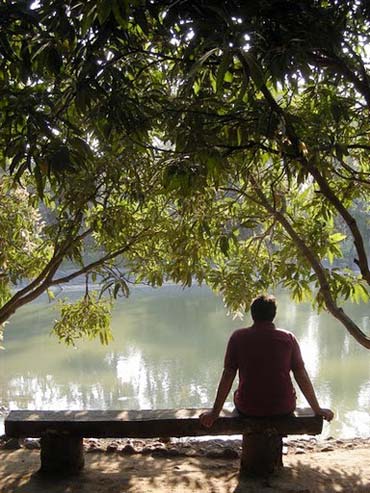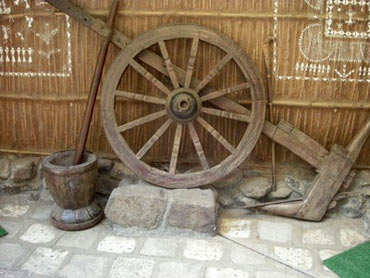
Among the many contributions that Gujaratis have made to the world, their cuisine perhaps remains unparalleled. Just the idea that you can do so much without any meat or fish continues to surprise some of my friends. It's probably one of the reasons why a bunch of us decided to hit the road one more time and take our taste buds on a trip.
Day One: Mumbai to Gholvad (156 km -- about a three hour drive)
Lunch: Maharashtrian thali at Sawe Farms
We left Mumbai on a winter morning at about 7 am with the express intention of having Ubadiu, a Gujarati speciality and a close but little-known cousin of the Undiyu. The Mumbai-Gujarat Highway has a whole lot to offer in terms of cuisines -- there are a handful of interesting Maharashtrian joints, some awesome Parsi eateries and of course a lot (and I mean a lot) of Gujarati thali places.
Cuisines along the borders have always fascinated me. The in-between-ness can sometimes be quite disastrous, but more often than not, it throws up some food that tastes interesting.
Food along the Maharashtra-Guajarat border is a case in point. As you go towards Gujarat, you will find food getting sweeter because Gujaratis have a very sweet tooth. This is a distant cry from the Kolhapuri cuisine that is essentially spicy and can leave the best of us teary-eyed.
And aside, if you are a foodie like me and you happen to be in Mumbai, a good place to try out 'Gujarati-Maharashtrian' food is the Girgaum area in South Mumbai, where the two communities have co-existed for generations, influencing each others' cuisines very heavily.
Our first stop on this journey is a place called Sawe Farms. Off the Ahmedabad Highway, this eco-friendly resort can be accessed by road and rail.
If you are travelling by road get off Ahmedabad Highway at Charoti Naka. It takes about an hour from here because the roads are narrow and not always in the best of the conditions. The milestones can be quite misleading and it is safest to ask for directions from the locals.
The nearest train head is Gholvad railway station on the Mumbai-Ahmedabad route from where it takes about five minutes by an auto rickshaw. Since Gholvad is a small station, you might consider the option of Dahanu, which is the previous station and has many more trains halting there.
Built on what was once a barren land in 1970, Sawe Farms is now a lush green haven. Their primary income comes from the sale of fresh fruit and vegetables into the direct market, but over the years the Sawe family has opened its doors to visitors and guests wanting to learn more about conservation and agriculture.
We reached Sawe Farms at about 10 am. Typical Maharashtrian breakfast -- Poha --awaited us. Now here was the catch. While I was expecting it to be sweet -- remember we were closer to Gujarat now -- the poha (or puffed rice) did not have a trace of sugar in it! The oil was low (again a surprise because Gujarati cuisine can be sinfully oily) and although I am not quite a fan of the dish, I found myself asking for more.
Lunch followed about three hours later -- well-balanced, vegetarian fare. Soft, thin chapattis sans any ghee, baingan bharta and a cauliflower preparation with hardly any oil, salads, curds, dal-rice and the works.
The plan was to leave soon after lunch but the weather was far too pleasant and the charpoys were just as inviting. We left Sawe Farms around teatime.
Alcohol consumption is prohibited here and only families are allowed to stay overnight. They take you on an educational tour of the farm, which is included in their tariff that ranges from Rs 750 to Rs 1,100 per night. They do not encourage on-the-spot check-ins. You have to book first.
Their official website is sawefarm.com and they can be reached over the phone on this number: Tel: (02528) 241130, Mob: 98220 78153,
Save Nursery Farm, Post: Gholwad, Tal. Dahanu, Dist. Thane. Pin -- 401 702. Maharashtra.
E-mail: save_nursery@yahoo.co.in
Day One: Gholvad to Tithal (75 km, about two hours drive)
Dinner: Ubadiu, off the streets
Next stop was at Tithal a village near the industrial town of Valsad. We were to spend the night at a friend's beach house and feast on Ubadiu.
Ubadiu is perhaps one of the more spicy dishes in the Gujarati cuisine. It has a lot of pepper and chilly, which is why you should not have it in any other season than winter.
All kinds of veggies go into it -- from potato and purple yam to beans and sweet potatoes, pretty much anything you want goes in and comes out tasting far better than ever. And of course there is mathri, a type of Gujarati farsan that is thick and sweet 'n' spicy.
The dish is usually made in earthen pots buried beneath soil with a flame burning till such a time that the ingredients are cooked.
Technically, it is a vegetarian dish. Some ingenious folks, however, add chicken and mutton to it. What makes this dish real yummy is a certain kind of leaves and a masala that has turmeric powder and looks like horse dung.
I am told different people eat ubadiu in different ways. Some like to have it with chapatti while others, like us, love it just like that. A somewhat blasphemous way of eating it -- something I like -- is to have it alongside fafda and sweet jalebi.
There is no one specific place to buy ubadiu. You can either make it on someone's farm, where you can get risque and add non-vegetarian ingredients. Or you could simply buy the authentic vegetarian version from one of the many roadside stalls that spring up during winter.
The thing about ubadiu is it can get quite messy when you eat it because the beans are cooked with the cover. To eat them, you've got to peel them out and throw away the skin. You might find some amount of uncooked vegetables, which again ,add to the pile of garbage. If you've cooked chicken with it expect some chicken bones in the mess.
In short, there is no civilised way of eating this dish. You simply spread a newspaper, pour out all the veggies (unlike undiyu, this one is completely dry and non-oily) on it and keep a garbage bag handy.
Having successfully devoured about three kilos of ubadiu -- it cost us some Rs 80 per kg -- between the four of us, we decided it was time to hit the sack. So there we were sleeping on an open terrace of a beach house, counting the stars, the sound of waves lulling us to sleep.
Ubadiu is definitely as tasty perhaps tastier than undhiyu. The best ubadiu can be bought off the streets during winter. A lot of makeshift stalls spring up during the time. You simply have to ask people for ubadiu and nine on ten people will point you in the right direction.
Video: Buying Ubadiu off the streets in Valsad

Day Two: Thithal to Abrama (7 km, about a 15 minute drive)
Lunch: Hotel Kathiawadi
The next morning it was jalebi-fafda for breakfast. Now the concept of having something fried and heavy for breakfast has never really fit into my scheme of things. But then again, we were in Gujarat and you know what they say -- 'When in Rome...'. Either way, I had no intention of having a heavy breakfast.
Today we were to head back to Mumbai and would be visiting two other places we couldn't during our journey to Tithal.
Lunch was at Hotel Kathiyawadi -- there are many by the same name but the one we visited is a small traditional joint opposite the Art Glass Factory -- in a census town called Abrama.
Tithal and Abrama are on either sides of Valsad. While Abrama has nothing touristy to do, Tithal has a beach and quite a few temples that attract tourists.
The hotel is just off the highway. A certain Joshi family runs this place, which is basically an extension of their house that has stood there for decades.
Having visited this place for years, by now we are pretty much fixed on what we want to have. We start with sev tameta, a gooey dish made of little else other than sev and tomato. It is predictably sweet but tastes heavenly. The fulkas are the way they should be -- small and thin with a generous amount of ghee over them! We also have their khichdi and masala khichdi with roasted papad that is unbelievably crisp and mouth-watering, to say the least.
Meals at Kathiyawadi come with their own share of problems. Most of their stuff is so good and sinful you don't know what to skip! Like always, we get some parcelled and are on our way back to Mumbai. But there is one more stop before we hit home.
Hotel Kathiyawadi, NH 8, Opposide Art Glass Factory, Near Auranga River, Abrama, Valsad 396 001. Ph: 02632-245082
Day Two: Abrama to Talasari (52 kms, about two hours drive)
Snacks: Parsi Da Dhaba
Parsi da Dhaba is a largish joint along the Ahmedabad Highway at Talasari. I am told that the owners are the same family that runs the Parsi Dairy Farm chain in Mumbai.
Things to die for here include the paneer and milk and milk products. This is also, perhaps, one of the few joints along this road that serve eggs -- their omelettes are to die for. A lot of people do stop by for lunch here but we prefer having evening snacks or breakfast.
Since we'd skipped the dhaba on our way to Valsad, we decided to visit it on our way back. The hitch though, was that we were far too full. So after much debate and discussion we settle for a cup of tea and shared between the four of us a dish of potato vadas that will give the Maharashtrians a run for their money and omelette-bread.
The rest, we shamelessly ask to be parcelled. This includes a few dishes of paneer pakodas, a few of more potato vadas and about a dozen glasses of sweetened milk.
The sun is setting as we return to the bustling city of Mumbai, our car stacked with unbelievable amounts of food -- we'd also packed about six kilos of ubadiu to share with our friends. As we stumble out of the vehicle carrying all that food we solemnly swear to skip dinner. Later that night, we've finished off everything we'd carried back from Parsi Da Dhaba and Kathiyawadi.
Tell us about little-known dishes like Ubadiu or eateries you came across during your travels. Write in to getahead@rediff.co.in with the subject line: 'Little-known delicacies'. We will publish the best stories right here.